Franz Joseph I Worksheets
Do you want to save dozens of hours in time? Get your evenings and weekends back? Be able to teach about Franz Joseph I to your students?
Our worksheet bundle includes a fact file and printable worksheets and student activities. Perfect for both the classroom and homeschooling!
Resource Examples
Click any of the example images below to view a larger version.
Fact File
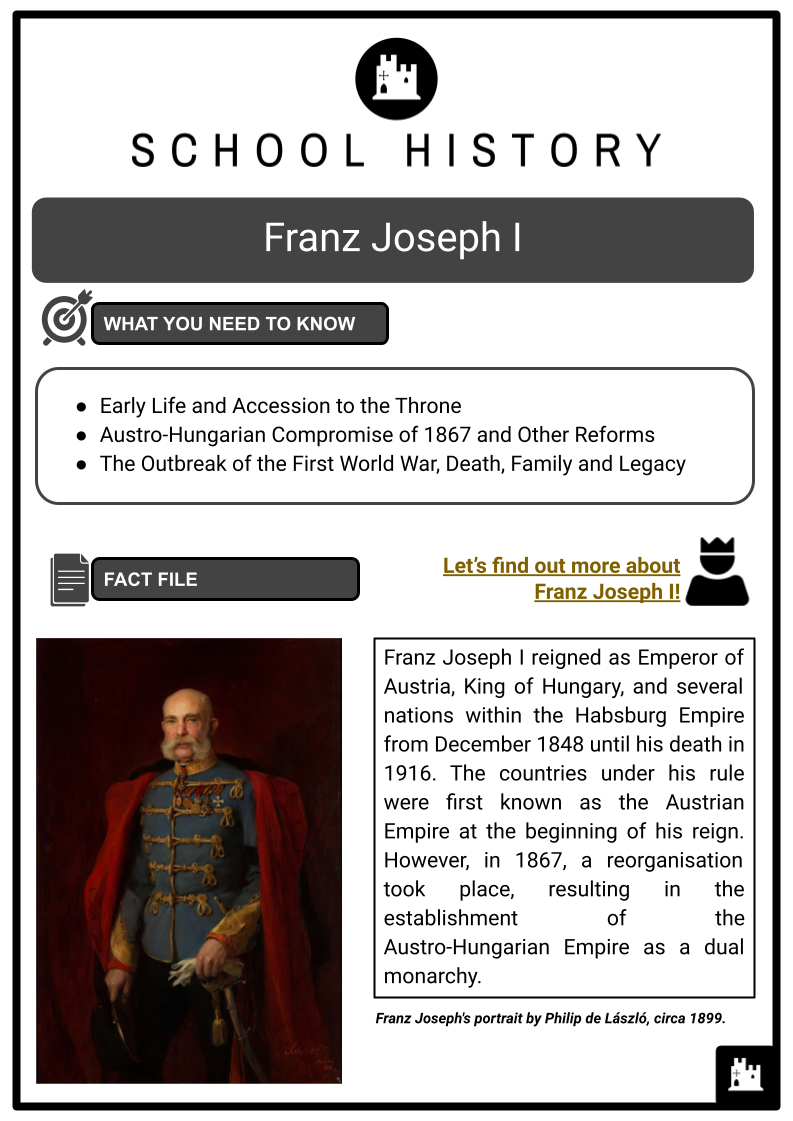
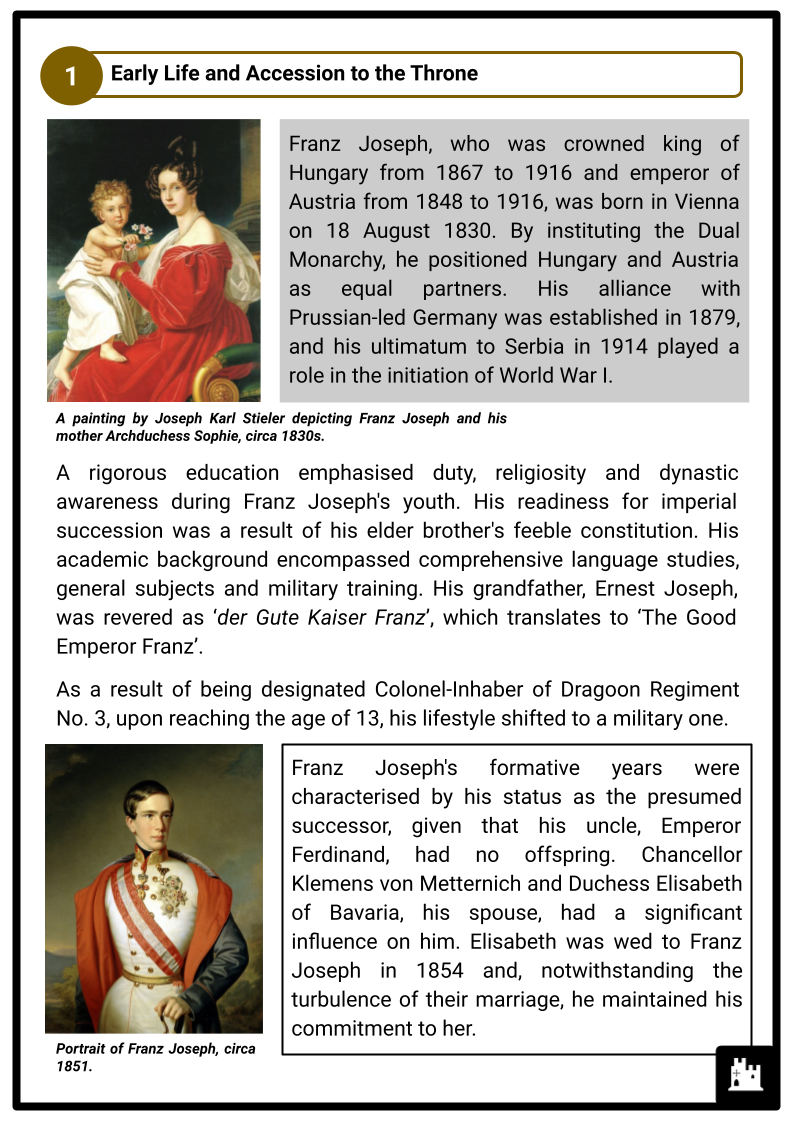
Student Activities
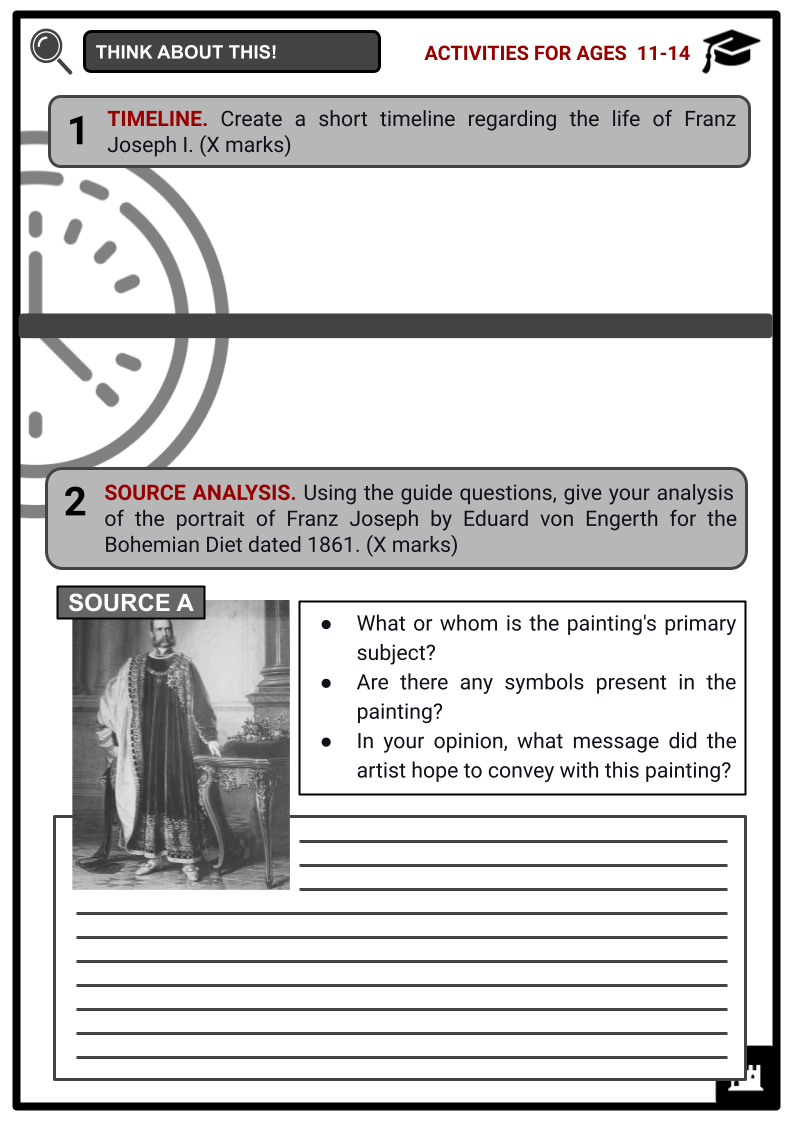
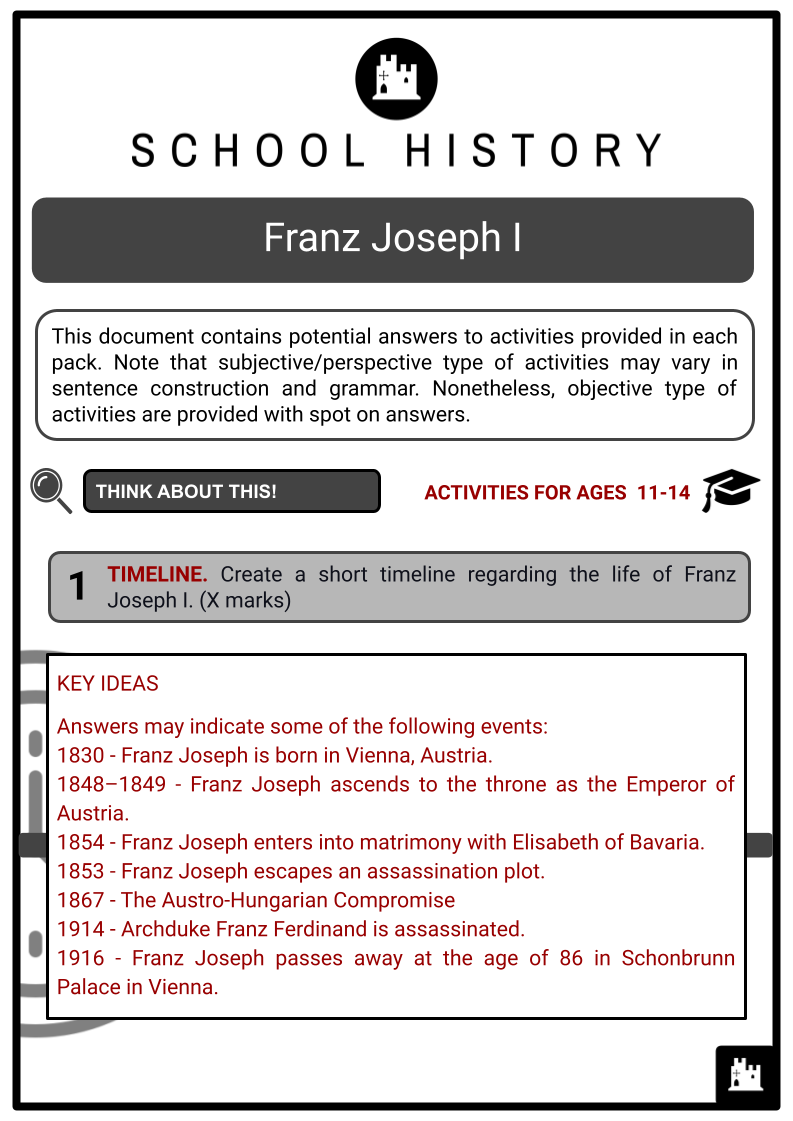
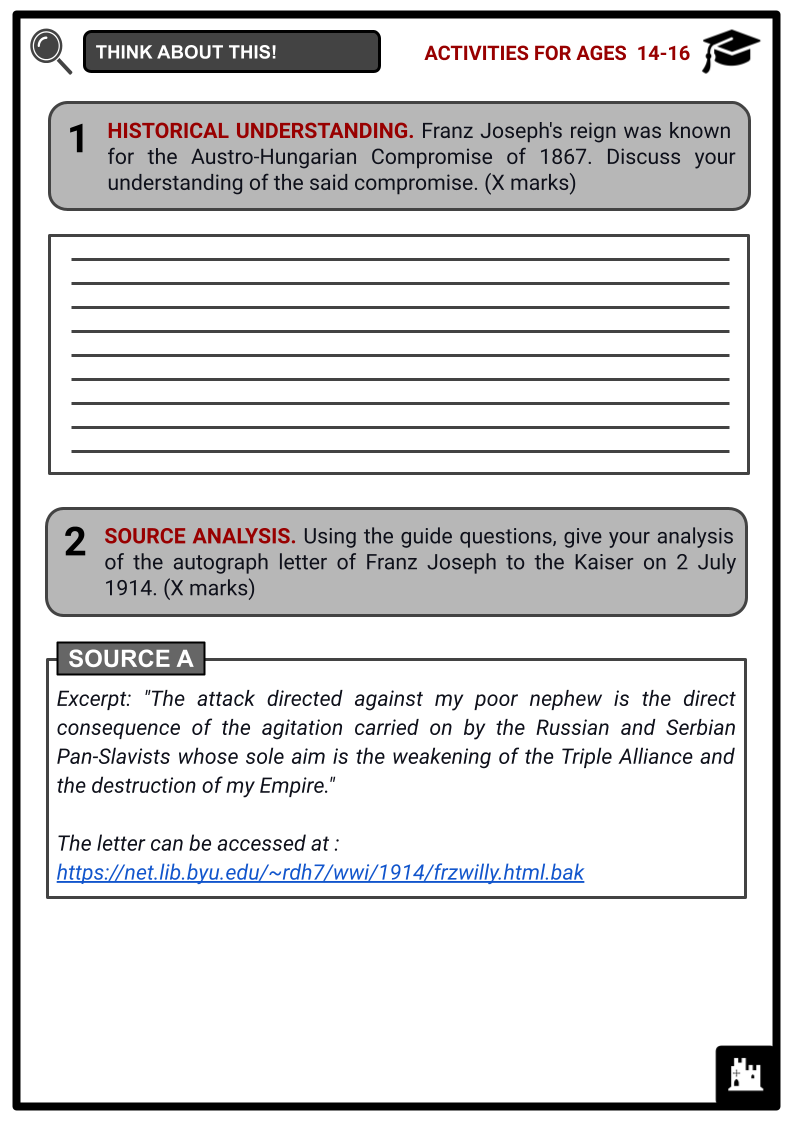
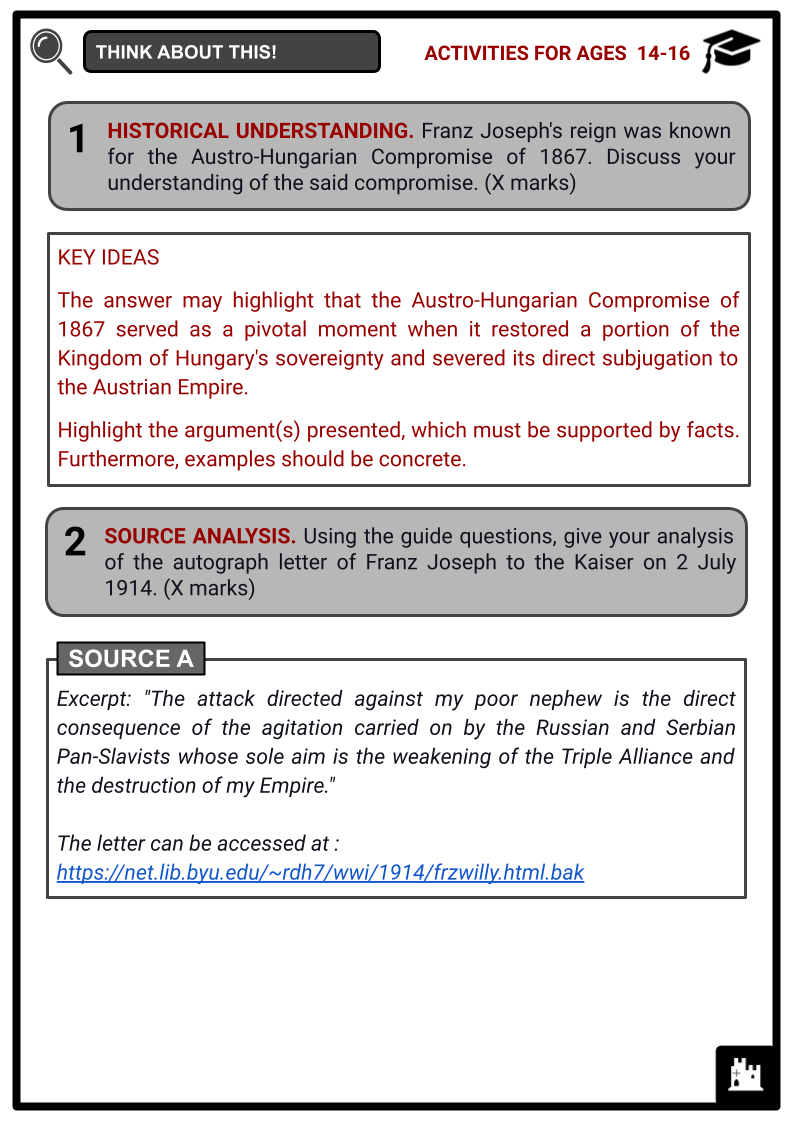
Summary
- Early Life and Accession to the Throne
- Austro-Hungarian Compromise of 1867 and Other Reforms
- The Outbreak of the First World War, Death, Family and Legacy
Key Facts And Information
Let’s find out more about Franz Joseph I!
Franz Joseph I reigned as Emperor of Austria, King of Hungary, and several nations within the Habsburg Empire from December 1848 until his death in 1916. The countries under his rule were first known as the Austrian Empire at the beginning of his reign. However, in 1867, a reorganisation took place, resulting in the establishment of the Austro-Hungarian Empire as a dual monarchy.
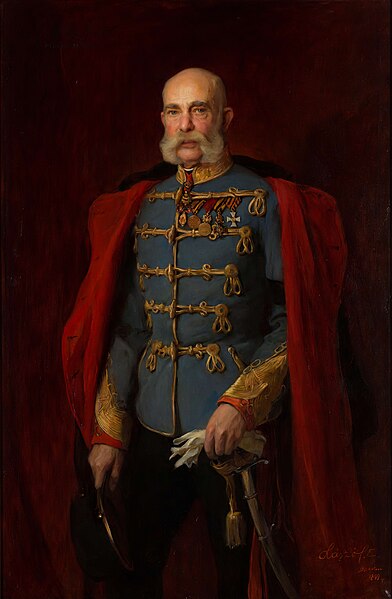
Early Life and Accession to the Throne
- Franz Joseph, who was crowned king of Hungary from 1867 to 1916 and emperor of Austria from 1848 to 1916, was born in Vienna on 18 August 1830. By instituting the Dual Monarchy, he positioned Hungary and Austria as equal partners. His alliance with Prussian-led Germany was established in 1879, and his ultimatum to Serbia in 1914 played a role in the initiation of World War I.
- A rigorous education emphasised duty, religiosity and dynastic awareness during Franz Joseph's youth. His readiness for imperial succession was a result of his elder brother's feeble constitution. His academic background encompassed comprehensive language studies, general subjects and military training. His grandfather, Ernest Joseph, was revered as ‘der Gute Kaiser Franz’, which translates to ‘The Good Emperor Franz’. As a result of being designated Colonel-Inhaber of Dragoon Regiment No. 3, upon reaching the age of 13, his lifestyle shifted to a military one.
- Franz Joseph's formative years were characterised by his status as the presumed successor, given that his uncle, Emperor Ferdinand, had no offspring. Chancellor Klemens von Metternich and Duchess Elisabeth of Bavaria, his spouse, had a significant influence on him. Elisabeth was wed to Franz Joseph in 1854 and, notwithstanding the turbulence of their marriage, he maintained his commitment to her.
- During campaigns in Italy during the 1848 Revolutions, the youthful archduke Franz Joseph, who was widely anticipated to succeed his uncle to the throne of Austria, assumed military responsibilities. In May 1848, his initial military encounter at Santa Lucia was characterised by composure and honour. In Innsbruck, Tyrol, the imperial family sought refuge. It was there that Franz Joseph encountered Elisabeth, his future spouse. The court returned to Vienna after Austria triumphed over the Italians in late July 1848 but subsequently relocated to Olmütz, Moravia.
- Alfred I, Prince of Windisch-Graetz, sought to install Franz Joseph as monarch because a novice would not be obligated to abide by constitutional pledges. The emperorship of Austria was crowned to Franz Joseph on 2 December 1848. With the support of Prime Minister Felix Schwarzenberg, he adopted an initial prudent stance and ratified a constitution in March 1849. Nevertheless, military campaigns against the Hungarians and Italians who rebelled against Habsburg authority were essential.
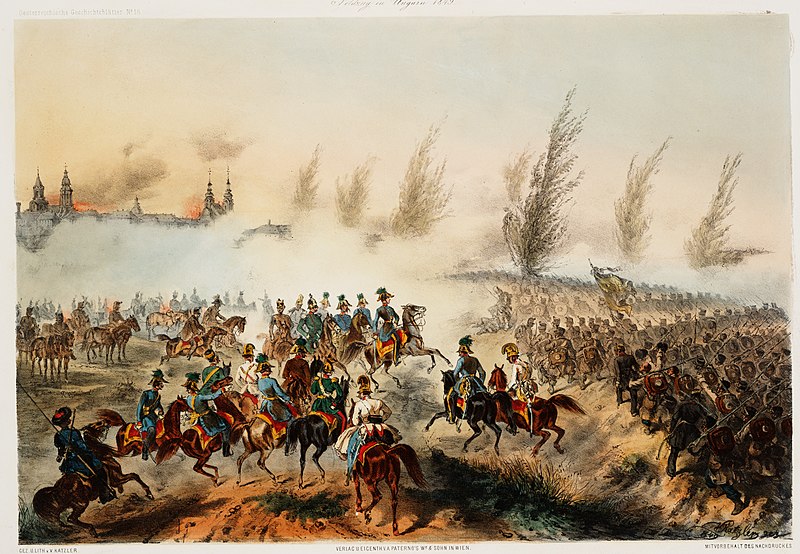
- The implementation of the Stadion Constitution and the revocation of crucial reform laws sparked the escalation of the conflict with Hungary.
- The implementation of martial law and the Hungarian parliament refusal to recognise Franz Joseph's throne led to a conflict over Hungary's complete independence. The emperor approached Russia in search of assistance, where the combined power of the Russian and Austrian armies ultimately defeated the Hungarians.
- The 1849 Stadion Constitution was a political document designed to tackle the impacts of the 1848 Revolutions. Named after Austrian statesman Franz Seraph von Stadion, it aimed to implement progressive changes while upholding the central power of the Habsburg monarchy. The constitution bestowed specific civil liberties, such as the freedom of the press and assembly, and established a bicameral parliament.
- After the restoration of order, Franz Joseph revoked the Constitution and adopted an absolutist, centrist stance. He escaped an assassination attempt in 1853 by the Hungarian nationalist János Libényi thanks to the sturdy collar of his uniform. Archduke Ferdinand Maximilian, the brother of Franz Joseph, solicited royal donations for the construction of the Votivkirche in Vienna, a memorial to the emperor's survival, in the aftermath of this event. The occurrence exerted an enduring influence on the reign of Franz Joseph and the political milieu of Austria.
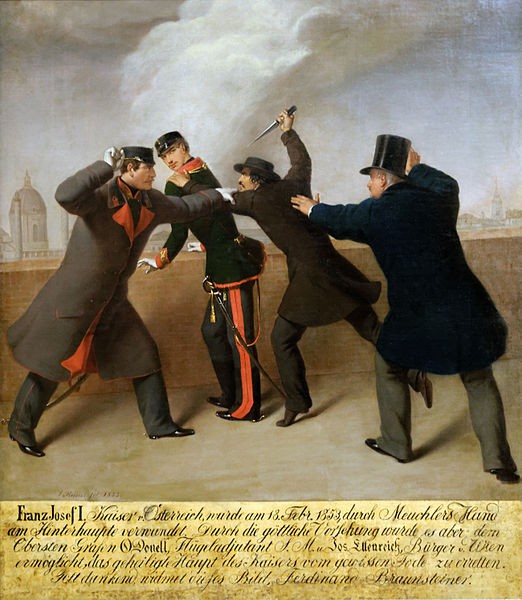
- Following the turbulent events that transpired between 1848 and 1849, Austria experienced a resurgence in its global stature. Chancellor Schwarzenberg was instrumental in preventing Prussian endeavours to form an Austria-excluding German Federation under Prussian authority. Unfortunately, it was difficult to locate a successor of comparable stature following the untimely demise of Arnold Schwarzenberg in 1852. As a result, Emperor Franz Joseph moved towards a more definitive position as prime minister.
- Franz Joseph's prominent position as the head of the Roman Catholic Church and his uncompromising opposition to Freemasonry set him apart in terms of leadership. The political environment was characterised by an intricate interplay between internal governance and international relations, with the monarchy and the ever-changing political forces vying for stability.
Austro-Hungarian Compromise of 1867 and Other Reforms
- Austrian foreign policy suffered a succession of setbacks in the 1850s, including the Crimean War, the dissolution of alliances, and defeat in the Second Italian War of Independence. The Austro-Prussian War of 1866 heightened the difficulties faced by Austria and ultimately contributed to the formation of the Austro-Hungarian Compromise of 1867.
- Throughout the negotiations that culminated in the Compromise, political leaders in Hungary pursued two primary goals. Initially, their objective was to legally and politically reinstate the Hungarian state to its traditional standing, which had been compromised after the Hungarian Revolution of 1848. Furthermore, they endeavoured to have the reform laws implemented by the revolutionary parliament of 1848 reinstated. The foundation of these laws was the 12 principles that delineated contemporary political and civil liberties, in addition to economic and societal transformations in Hungary.
- The Austro-Hungarian Compromise of 1867 served as a pivotal moment when it restored a portion of the Kingdom of Hungary's sovereignty and severed its direct subjugation to the Austrian Empire. In addition, Hungary was accorded the status of an equal partner with Austria, which effectively terminated the 18-year reign of military dictatorship and absolutism instituted by Emperor Franz Joseph at the onset of the Hungarian Revolution of 1848. On 8 June, Franz Joseph was formally crowned King of Hungary, and on 28 July, he enacted legislation that formally established the Dual Monarchy of Austria-Hungary over the Habsburg domains.
- The triumph of the Compromise was ascribed by Emperor Franz Joseph to the combined efforts of himself, Deák and Andrássy. Despite Austria experiencing increasing political challenges in the late 19th and early 20th centuries, the patriarchal authority of Franz Joseph was pivotal in maintaining the Empire's cohesion. Amid factionalism and political discord, his authority served as a unifying force.
Foreign Relations
Kingdom of Bohemia
- Following Franz Joseph's succession to the throne in 1848, political representatives from the Kingdom of Bohemia sought that their historical state privileges be recognised in the new constitution. They espoused the idea of holding the coronation in Prague as a means to accentuate the status of Bohemia within the Habsburg monarchy. Nevertheless, the historical implementation of hereditary authority in Bohemia under the Habsburgs did not require an additional coronation.
- The objective of instituting neo-absolutism in Austrian domestic matters was to administer the Austrian Empire bureaucratically and centrally. Although Franz Joseph encountered setbacks in Italy, his reestablishment of constitutional rule sparked renewed debates regarding his coronation as King of Bohemia in 1861. Nevertheless, constitutional issues impeded the progress of the negotiations. A triumphant sojourn to Prague ensued in 1866, after the defeat of Franz Joseph at the Battle of Koniggratz.
- As a result of the Austro-Hungarian Compromise of 1867, the Czechs were deprived of the anticipated acknowledgement of distinguishable Bohemian state rights. Dissatisfaction over military losses incurred during the Austro-Prussian War led to protests and open demonstrations in Bohemia, which expressed opposition to dualism.
- In 1870–1871, efforts to address the concern regarding Bohemia were recommenced, during which time Franz Joseph declared his desire to be coronated. The 1871 negotiations that resulted in the articles sought to establish a clear and precise connection between the Habsburg Monarchy and the Bohemian Crown. Disadvantages, such as the establishment of the German Empire and domestic resistance, ultimately impeded the progress of these articles. Notwithstanding continuous political transformations and the participation of notable individuals such as Tomá Garrigue Masaryk, the concern regarding Bohemia endured and remained unresolved for the duration of Franz Joseph's reign.
Germany
- The consolidation of Germany under the House of Habsburg was the principal objective of Franz Joseph's foreign policy. This aspiration was based on historical precedent, given that the German monarchy was largely under the control of the Habsburgs until the fall of the Holy Roman Empire in 1806. Addressing the concern regarding Germany gave rise to two distinct factions: those in favour of Greater Germany, who advocated for the incorporation of Austria into a unified German state, and those in favour of Lesser Germany, who opposed Austria's inclusion on account of its status as a multi-nation state. Following Prussia's triumph in the Seven Weeks War, the rivalry between Austria and Prussia grew more intense, culminating in Austria's eventual exclusion from German affairs.
- To preserve peace in Europe, Franz Joseph, Emperor Wilhelm I of Germany and Emperor Alexander II of Russia joined the League of Three Emperors in 1873. The league persisted on a sporadic basis until 1887.
- In addition, regarding Bosnia and Herzegovina, in the mid-1870s, uprisings against Ottoman rule in the Balkans prompted Russia and Austria-Hungary to enter into intervention agreements. Following the 1878 Treaty of Berlin, Austria was granted permission to occupy Bosnia-Herzegovina. The annexation in 1908, in particular, contributed to diplomatic crises that escalated tensions between Austria-Hungary and Serbia, ultimately requiring a revision of the Treaty of Berlin in 1909.
The Outbreak of the First World War, Death, Family and Legacy
- The starting point of World War I occurred on 28 June 1914, when Archduke Franz Ferdinand and his spouse Sophie were assassinated in Sarajevo. Yugoslav nationalist Gavrilo Princip was responsible for the assassination. After being informed of the death of his nephew and heir-presumptive, Franz Joseph conveyed his agreement with the restoration of order by a superior power. The responsibility for making decisions during the July Crisis rested with influential individuals within the Austro-Hungarian government. When Serbia was presented with an ultimatum, the stage was set for conflict. War was proclaimed on 28 July 1914, and on 6 August 1914, Franz Joseph affixed his signature to the declaration of war against Russia.
- On 21 November 1916, at the age of 86, Franz Joseph died in the Schonbrunn Palace. He succumbed to pneumonia of the right lung after contracting a chill during a stroll in Schonbrunn Park. He was succeeded by Charles I, his grandnephew, and was buried in the Imperial Crypt in Vienna.
- Regarding Franz Joseph's family, his mother had a significant influence on his private life. Although Princess Anna of Prussia and Princess Elisabeth of Modena were among the potential brides the emperor considered, Franz Joseph fell in love with Elisabeth, also known as Sisi, who happened to be the younger sister of his intended bride, Helene. It was said that their union was unsatisfactory and plagued by disasters. Sophie, their firstborn daughter, passed away during infancy, and Rudolf, their only son, committed suicide in 1889. Sisi regarded the 34-year relationship between Franz Joseph and actress Katharina Schratt with toleration but maintained a platonic stance. In 1898, an anarchist fatally stabbed Elisabeth, inflicting deep sorrow on Franz Joseph, who was unable to completely recuperate from the tragedy.
- Concerning Franz Ferdinand's announcement of his intention to marry Countess Sophie Chotek, it exacerbated the already strained relationship between Franz Joseph and his nephew who was also the presumed heir to the throne. Despite his initial opposition to the union, Franz Joseph allowed it in 1900 and proclaimed the marriage morganatic, marriage between people with unequal social rank, thereby disqualifying their offspring from ascending to the throne.
- Franz Joseph's reign was marked by one of the most effective civil administrations in Europe, which characterised Austria-Hungary. He retained authority over military affairs and foreign policy, attributing any criticism to himself. He restricted the influence of ministers, and after their dismissal, they ceased to be consulted, despite his allegiance to them.
- In his later years, Franz Joseph, who had been initially esteemed but unpopular, attained international veneration while attempting to cease the decline of the empire. Throughout his reign, Franz Joseph ruled the empire, which encountered obstacles but also produced social legislation and reforms concerning its foreign relations, all of which reflected the emperor's commitment to duty.
Image Sources
Frequently Asked Questions
- Who was Franz Joseph I?
Franz Joseph I was the ruler of the Austro-Hungarian Empire from 1848 until he died in 1916. He was one of the longest-reigning monarchs in European history.
- What were Franz Joseph I's significant accomplishments during his reign?
Franz Joseph I oversaw significant political, social, and military changes within the Austro-Hungarian Empire. His reign saw the empire's expansion through diplomacy and war, the implementation of administrative reforms, and the promotion of cultural and economic development.
- How did Franz Joseph I come to power?
Franz Joseph I ascended to the throne in 1848 after the abdication of his uncle, Ferdinand I, during the Revolutions of 1848. His reign began during political upheaval and reform efforts across Europe.
